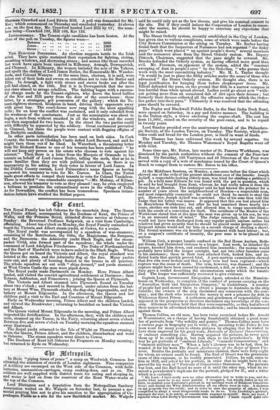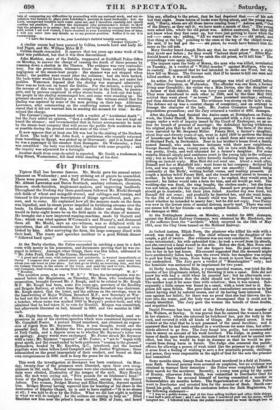'hr 3rtrupolio. -
In these "piping times of peace " a camp on Woolwich Common has attracted the attention of crowds of London sightseers. Nine companies of Artillery are encamped on the West side of the Common, with field- batteries, ammunition-carriages, camp cooking-fires, and so on. The soldiers are well supplied with district tents for eating and sleeping in, and water is laid on from the reservoir of the Kent Water-works at the top of the Common.
Lord Ebrington and a deputation from the Metropolitan Sanitary Association waited on Mr. Walpole on Saturday last, to present a me- morial praying him not to give his sanction to the appropriation of Co- penhagen Fields as a site for the new Smithfield market. Mr. Walpole said ho could only act as the law directs, and give his nominal consent to the site. But if they could induce the Corporation of London to recon- sider the matter, he should be happy to entertain any objections that might be raised.
The Street Orderly system, recently established in the City of London, has given rise to various complaints, some of which were made before the City Sewers Commission at the sitting on Tuesday. Mr. Barber having found fault that the Inspectors of Nuisances had not reported " the filthy pans " which were placed " up against people's doors," several members said the nuisances arose from the Street Orderly system. Mr. Deputy Peacock, Chairman, suggested that the pans might be covered. Mr. Brooke defended the Orderly system, as having effected more good than evil. Mr. Freeman, an opponent of the system, added the " constant sweeping of dust in people's eyes" by the. Orderlies, " who pursue their work with the most unremitting industry." Mr. H. L. Taylor thought "it would be just to place the filthy articles under the noses of those who advocated " the Street Orderly system. He thought also, there is no legal justification for hanging them before shopkeepers' doors. Mr. Elliott defended the pans, on the ground that filth in a narrow compass is less hurtful than when spread abroad. Ladies could go about now " with- out getting more than an occasional dab of dirt upon their dresses ; but formerly their dresses collected all the offensive matter which the Order- lies gather intd their pans." Ultimately it was resolved that the offending pans should be covered.
The Poplar and Blackwell Public Baths, in the East India Dock Road, were opened on Saturday, in a gay and festive manner. The building is in the Italian style, a tower enclosing the engine-shaft. The cost has been 11,5001., raised on the security of the poor-rates, and to be repaid in twenty years.
Lord Stanley presided over the anniversary festival of the Philanthro- pic Society, at the London Tavern, on Tuesday. The Society, which pro- vides coals and bread for the London poor, is itself in want of funds.
The Thames has been enlivened this week by several regattas. On Monday and Tuesday, the Thames Watermen's Royal Regatta went off with éclat.
Some time ago, Mr. Eaton, late master of St. Pancras Workhouse, was dismissed by the parish authorities without the consent of the Poor-law Board. On Saturday, 120 Vestrymen and 40 Directors of the Poor were served with a copy of a writ of mandamus issued by the Court of Queen's Bench to compel them to restore Mr. Eaton to his office.
At the Middlesex Sessions, on Monday, a case came before the Court which showed one of the evils of the present insufficient care of the lunatic. Joseph Aylieff a respectable-looking elderly man, was tried for stealing a publican's I
pot. n a field near Kilburn he was found with the pot in question, which he said he had brought from Kent, whereas he had really taken it from the Swan Inn at Hendon. The innkeeper said he had known the prisoner for a number of years about the neighbourhood of Hendon—a respectable man, and most respectably connected: he could not think he meant to steal the pot. However, Joseph Aylieff was convicted. One of his sons then told the Judge that his father was insane. It appeared that this son had placed him in Marylebone Workhouse ; but after he had remained there nearly two years, another son took him out; and allowed him to range uncontrolled— with the result of a conviction for theft. The certificate of the Master of the Workhouse stated that at the time the man was given up to his son, he was " in an unsound state of mind." The Judge remarked, that the lunatic would not have been discharged from any regular public asylum unless his relatives had given security that ho should be placed under proper restraint. Sergeant Adams would not try him on a second charge of stealing a shawl. The formal sentence was six months' imprisonment with hard labour ; but, ori a surgeon's certificate of insanity, the poor man is to be placed in an asylum.
William Cork, a pauper lunatic confined in the Red House Asylum, Beth- nal Green, had threatened violence to a keeper. Last week, he attacked the keeper, knocked him down, and rendered him insensible ; the maniac would probably have killed' the keeper outright, had not two other lunatics come to his assistance ; these in their turn attacked Cork, kicked him, and in- flicted hurts that quickly proved fatal. A post-mortem examination showed that five ribs were broken and that a large vein had been ruptured—which rupture was the cause of death. The vein, however, was diseased ; and the rupture might have been caused by excitement, a fall, or a blow. A Coroner's Jury gave a verdict describing the circumstances under which the lunatic died. The keeper was sufficiently recovered to give evidence.
Captain Lean Government Emigration Agent, attended at the Mansion- house on Wednesday, to complain of the conduct of persons carrying on the "Australian Gold and Emigration Company," in Austinfriars. A number of people had paid money there to obtain a passage to Australia in the ship Camilla ; the owners of the ship disclaimed any connexion with the com- pany; and the clerk who received the money is now a prisoner for debt in Whitecross Street Prison. A nobleman and gentlemen of responsibility who appeared in the prospectus as directors disclaimed any knowledge of the con- cern. Alderman Carden held that they were responsible, as they had allowed their names to be advertised without contradiction ; and he issued summonses against them. .
Thomas Collins, an old man, has been twice examined before Mr. Arnold at Westminster, on a charge of having fraudulently obtained a great num- ber of portraits from "the nobility and gentry." Thomas Collins must have a curious page in biography yet to write ; for, according to the Police he has been wont for many years to obtain pictures by allegjmg. that 'he wished to have them engraved for his great work, Portrasts of Eminent Conservatives, or eminent something else. Having acquired the pictures, he never gave them up if he could help it, but took them to the pawnbroker's. In this way he got portraits of "eminent Liberals," "eminent Conservatives," and "eminent military men." When a lady's likeness was to be had, then he wanted it for his work The Female Aristocracy of the Reign of Queen Vic- toria. Besides the portraits and miniatures claimed, there were forty-yight for whom no owners could be found. The Earl of Desart was the proximate cause of this exposure, as he readily prosecuted. Collins, he said, came to him in 1848, and asked for his portrait, in order that he might have it en- graved for his work of " Portraits of Conservative Statesmen." The portrait was lent, and the Earl heard no more of it until the other day, when he re- ceived a pawnbroker's duplimte for the portrait, pledged for 21., and a letter which is a curiosity. t' My Lord—I have really now no other alternative but to write to you, and de- scribe what must be to me most painful. I struggled, but wholly failed in my ef- forts, to publish your Lordship's portrait in national work of Eminent Conserva- tives; and during the Whig Administration all my efforts were in vain. A distress on my property was the result; and in order to save the property of others, I ices compelled to adopt a moat disagreeable mode to do so. Your Lordship's portrait, amongst the rest, is in safety, at considerable expense to myself. How, my Lord, I rejoiced when Lord Derby's Government was installed ! I made myself quite ter- fain of conquering my difficulties by proceeding with my national work, and my re- solution was formed to place your Lordship's portrait in hand forthwith; but, my Lord, unexpected troubles have come upon me, and I therefore candidly and openly confess my position. I enclose the document (the pawnbroker's ticket) to show that the property is in safety; but, my Lord, not being able to conquer the troubles with which f am now visited, I have resorted to your Lordship without loss of time. I will not enter into any details as to my present position. Suffice it to say it is excruciating.
" I have the honour to be, your Lordship's faithful bumble servant,
" Taostas COLLINS." A similar course had been pursued by Collins towards Lord and Lady Al- fred Paget, and Mr. William Miles M.P.
Collins stands remanded. It appears that ten years ago some work of the kind was published, but that it was then discontinued.
John Maddox, mate of the Dahlia, reappeared at Guildhall Police Office on Monday, to answer the charge of causing the death of three persons by rennin down a shallop in the Thames. The evidence was very contradic- tory. For the prosecution, witnesses threw the blame entirely upon the negligence of the steam-boat people : the steamer was not stopped when hailed ; the paddles went round after the collision ; had she been backed, the back-water would have fleeted the shallop away from her, not under her paddles. Watermen deposed that the shallop was managed admirably : there was no look-out on board the Dahlia. For the defence, a story quite the reverse of this was told by . people employed in the Dahlia, by passen- gers, and by persons employed in other steam-boats. A look-out was kept; the people in the shallop mismanaged her, and some were standing up : the prisoner shouted to the shallop as a warning. One witness stated that the shallop was capsized by some of the men getting on their legs. Alderman Lawrence, after commenting on the conflicting nature of the testimony, stated that it did not warrant him in sending the accused for trial: he dis- missed the charge. The Coroner's inquest terminated with a verdict of "Accidental death" - but the Jury added an opinion, " that a sufficient look-out was not kept on board-the steamer ; and recommended that in future arrangements be made ' by the steam-boat company that will secure the public from accidents as far as possible during the present crowded state of the river."
It now appears that at least one life was lost by the sinking of the Duchess of Kent. The body of Mr. John Sard, a gentleman who recently returned from travelling in Egypt, was picked up at Gravesend ; and it is found that i he was a passenger in the steamer from Ramsgate. On Wednesday, a Jury was assembled : the body was identified, together with some property • and the inquiry was adjourned for a fortnight.
Another death from coup-de-soleil is reported. Mr. Goold, a tradesman King Street, Westminster, fell dead while standing at his door.



























 Previous page
Previous page